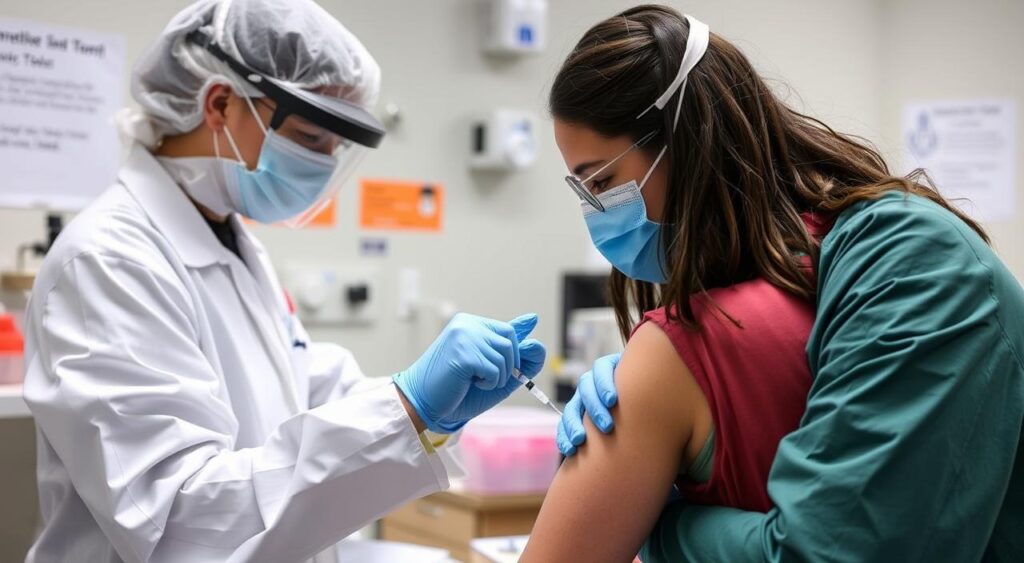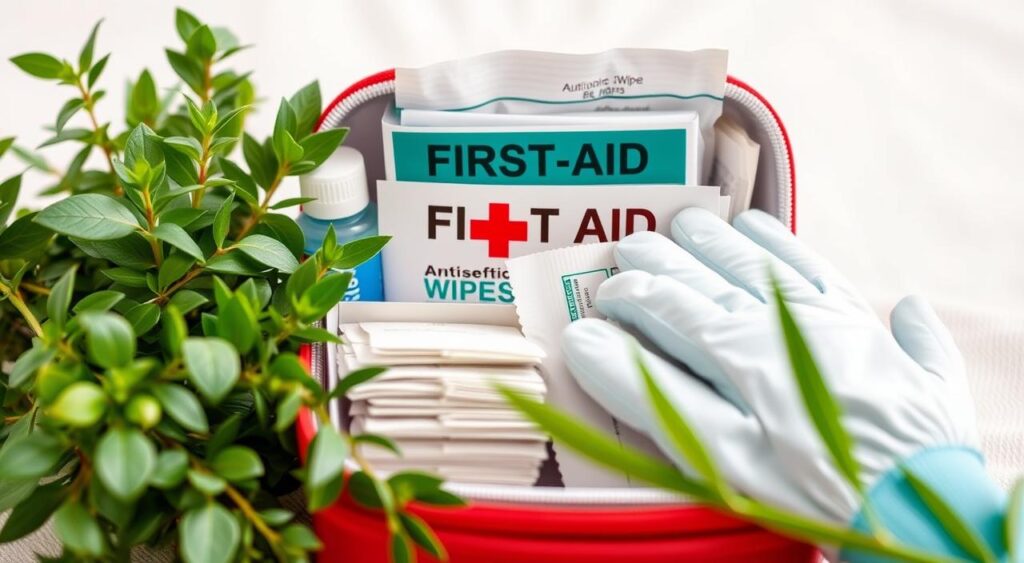Every year, 1 million people worldwide get tetanus, and about 300,000 die from it. Tetanus is a serious infection caused by Clostridium tetani. It can lead to severe symptoms if not treated quickly. Knowing how to treat tetanus and spotting its early signs is key to getting help fast.

Key Takeaways
- Recognizing tetanus symptoms is essential for prompt treatment and prevention.
- Tetanus treatment options are available to manage the infection and prevent further complications.
- Understanding the causes of tetanus can help prevent the infection.
- Tetanus can have severe consequences if left untreated, including death.
- Seeking medical attention immediately is crucial if tetanus symptoms are present.
- Prevention and awareness are key to reducing the risk of tetanus infection.
- Staying informed about tetanus symptoms, causes, and treatment options can help individuals stay safe and protected.
Understanding Tetanus: A Potentially Fatal Bacterial Infection
Tetanus is a serious bacterial infection caused by Clostridium tetani. It’s found in soil, dust, and animal guts. When it gets into the body, it makes toxins that harm the nervous system. This leads to muscle stiffness, spasms, and rigidity. Every year, thousands of people worldwide get tetanus.
The symptoms of tetanus can vary. But common tetanus symptoms include muscle stiffness, spasms, and rigidity. In severe cases, it can cause respiratory failure, cardiac arrest, and even death. Knowing how tetanus works is key to stopping it and treating it.
- Tetanus is caused by the bacterium Clostridium tetani
- Tetanus can enter the body through cuts, wounds, or other injuries
- Tetanus symptoms can appear anywhere from a few days to several weeks after infection
- Tetanus can be prevented through vaccination and proper wound care
By understanding tetanus, we can prevent it. It’s crucial to know the risks and protect ourselves and our loved ones. This serious disease can be stopped with the right steps.
| Tetanus Facts | Description |
|---|---|
| Cause | Clostridium tetani bacterium |
| Symptoms | Muscle stiffness, spasms, and rigidity |
| Prevention | Vaccination and proper wound care |
Common Ways Tetanus Enters the Body
Tetanus is a bacterial infection that can get into the body in many ways. This includes cuts, wounds, and puncture injuries. The bacteria, Clostridium tetani, live in contaminated soil, dust, and animal feces. This makes it a big risk for people who work outside or do activities that get them dirty.
It’s important to know how tetanus gets into the body to prevent it. Here are some common ways it happens:
- Cuts and wounds: Open wounds can let tetanus bacteria in, especially if they’re deep or dirty.
- Puncture injuries: Wounds from nails or needles can also let tetanus in.
- Contaminated soil and dust: Tetanus bacteria are in dirty soil and dust. This is a risk for those who work outside or get dirty.
To avoid lockjaw and tetanus symptoms, it’s key to take preventive steps. Knowing how tetanus gets in helps. People can protect themselves by getting vaccinated and taking care of their wounds.
By being careful, people can lower their chance of getting tetanus. This means avoiding lockjaw and muscle stiffness. Good tetanus prevention helps keep people safe from tetanus’s serious effects.
| Common Ways Tetanus Enters the Body | Risk Factors | Preventive Measures |
|---|---|---|
| Cuts and wounds | Contaminated soil and dust | Proper wound care |
| Puncture injuries | Outdoor work or activities | Vaccination |
| Contaminated soil and dust | Animal feces | Avoiding contact with contaminated substances |
Risk Factors for Tetanus Infection
Knowing the risk factors for tetanus is key to preventing and managing it. Tetanus risk is higher for those who work with soil, dust, or animals. Getting the tetanus vaccine helps prevent the infection, but it’s important to know who needs it.
Several factors increase the risk of tetanus infection. These include:
- High-risk activities, such as gardening or farming, which expose individuals to soil and animal waste
- Environmental risk factors, such as poor sanitation and lack of access to clean water
- Medical conditions, such as diabetes and immunodeficiency disorders, which weaken the immune system
People with these risk factors should take extra steps to prevent tetanus. This includes getting the tetanus vaccine and practicing good wound care. By understanding the risk factors, individuals can protect themselves and prevent the disease.
The tetanus vaccine is a powerful tool against tetanus infection. It’s recommended for those at high risk. By getting vaccinated and practicing good wound care, individuals can lower their risk of tetanus infection and stay safe.
| Risk Factor | Description |
|---|---|
| High-risk activities | Exposure to soil and animal waste |
| Environmental risk factors | Poor sanitation and lack of access to clean water |
| Medical conditions | Weakened immune system due to diabetes or immunodeficiency disorders |
Recognizing the Early Signs of Tetanus
Tetanus symptoms can be hard to spot at first. But it’s key to catch them early to get treatment and avoid worse problems. Early signs include muscle stiffness, spasms, and rigidity. Also, trouble swallowing and breathing. Lockjaw is a common sign, where the jaw muscles get stiff, making it hard to open the mouth.
Knowing these symptoms is crucial to get medical help right away. Treatment for tetanus usually involves wound care, medicine, and sometimes hospital stay. If not treated, tetanus can cause serious issues like respiratory failure and cardiac arrest.
It’s also important to know about tetanus treatment and how to prevent it. This means keeping vaccinations current and taking good care of wounds. Being aware of tetanus signs and taking preventive steps can lower the risk of infection. It also ensures timely treatment if symptoms show up.
Some key points to remember about tetanus symptoms and treatment include:
- Seek medical attention immediately if symptoms occur
- Keep vaccinations up-to-date
- Practice proper wound care to prevent infection
Critical Tetanus Symptoms to Never Ignore
Tetanus symptoms can vary from mild to severe. It’s crucial to spot them early to get medical help fast. Early treatment often includes a tetanus shot, which can ease symptoms and prevent worse issues.
Common signs include lockjaw, muscle stiffness, and painful spasms. In serious cases, breathing problems and failure can happen. If you notice these symptoms, get medical help right away.
Lockjaw and Muscle Stiffness
Lockjaw, or trismus, is a common sign. It makes the jaw stiff, making it hard to open your mouth. Muscle stiffness can also affect other areas like the neck, back, and belly.
Breathing Difficulties
In severe tetanus, breathing can become hard. This is because muscles in the chest and belly get stiff. In extreme cases, it can lead to respiratory failure, which is very dangerous.
If you see any tetanus symptoms, get medical help fast. A tetanus shot can help manage symptoms and prevent more problems. Treatment might also include wound care, pain relief, and support.
| Tetanus Symptom | Description |
|---|---|
| Lockjaw | Stiffness and tightness in the jaw muscles |
| Muscle Stiffness | Stiffness and tightness in the muscles of the neck, back, and abdomen |
| Breathing Difficulties | Difficulty breathing due to muscle stiffness in the chest and abdominal muscles |
Emergency Treatment for Tetanus Exposure
When you get exposed to tetanus, quick tetanus treatment is key to avoid serious issues. This treatment includes cleaning the wound, dressing it, and giving tetanus immunoglobulin and antibiotics. In bad cases, you might need to stay in the hospital to manage symptoms and stop complications.
People who haven’t had a tetanus shot in 10 years get one. This shot boosts your immune system to fight off tetanus. Remember, getting a tetanus vaccine is not just one shot. It’s a series of shots over time.
Some important steps in emergency tetanus treatment are:
- Wound cleaning and dressing
- Administration of tetanus immunoglobulin and antibiotics
- Hospitalization in severe cases

It’s also vital to see a doctor right away if you think you’ve been exposed to tetanus. A healthcare expert can check you out and give the right tetanus treatment. Getting a quick tetanus shot and tetanus vaccine can lower your risk of tetanus and help you get better fast.
Long-Term Treatment and Recovery Process
The treatment for tetanus can take a long time and needs careful attention. After the first emergency steps, patients often stay in the hospital. Here, they get medicine to control symptoms and care for their wounds to stop more infections.
It’s important to know about the tetanus recovery process. The time it takes to get better and what to expect can change. Tetanus prevention like getting vaccinated and taking care of wounds is key to avoiding the infection.
Hospital Care Procedures
In the hospital, patients are watched closely. They get medicine and their wounds are managed. The goal is to help them recover safely and avoid any problems.
Medication and Wound Management
Medicine is a big part of treating tetanus. It helps control symptoms and stops the infection from getting worse. Taking care of the wound is also crucial. This means cleaning and dressing it to help it heal and prevent infection.
Recovery Timeline and Expectations
The time it takes to recover from tetanus can vary. Most patients stay in the hospital for weeks. After leaving, they may still need to take medicine and care for their wounds to fully recover. Tetanus recovery is a long and tough journey, but with the right treatment and care, most people can get better.
| Tetanus Treatment Stage | Description |
|---|---|
| Hospital Care | Close monitoring of the patient’s condition, administration of medication, and wound management |
| Medication and Wound Management | Management of symptoms and prevention of further infection through medication and wound care |
| Recovery | Several weeks of hospitalization, followed by continued medication and wound care after discharge |
The Importance of Tetanus Vaccination
Tetanus vaccination is key to preventing tetanus infection. The vaccine is given in several shots, with boosters every 10 years to keep immunity strong. Knowing the tetanus vaccine schedule and booster shots is important. It helps keep people safe from tetanus.
A tetanus shot is often given with other vaccines like diphtheria and pertussis. It’s vital to stick to the tetanus vaccine schedule for good protection. Keeping up with vaccinations is a lifelong effort to avoid tetanus.
- Follow the recommended tetanus vaccine schedule
- Get booster shots every 10 years
- Ensure all family members are up-to-date on their tetanus vaccinations
By following these steps, people can greatly lower their risk of tetanus. Regular tetanus shots and boosters are crucial for preventing tetanus and keeping immunity strong.
Preventing Tetanus Through Proper Wound Care
Proper wound care is key for tetanus prevention. It means cleaning and dressing wounds right. Also, get medical help if you see signs of infection. Knowing how to care for wounds can lower your tetanus risk.
Some important steps in wound care are:
- Cleaning the wound with soap and water
- Applying an antibiotic ointment to the wound
- Covering the wound with a bandage or dressing
If you notice lockjaw or muscle stiffness, see a doctor. Tetanus treatment often includes shots and medicine for symptoms.

By following these steps and getting medical help when needed, you can lower your tetanus risk. Remember, tetanus prevention is crucial to avoid serious complications.
Special Considerations for Different Age Groups
Tetanus risk and prevention change with age. It’s important to know these differences to protect against tetanus. Some age groups face higher risks due to their lifestyle, health, or environment.
Children and Tetanus Risk
Children are more at risk for tetanus because they love to explore. This curiosity can lead to injuries that might get infected with tetanus. It’s key for parents and caregivers to make sure kids get their tetanus shots on time and take care of wounds well.
Elderly Care and Prevention
The elderly might face a higher tetanus risk because of health issues. Regular health checks and booster shots can help prevent tetanus. They should also avoid injuries, especially in places where tetanus bacteria are common.
Pregnancy and Tetanus Protection
Pregnant women need special care for tetanus protection. Tetanus can harm both the mother and the baby. It’s important for pregnant women to stay up-to-date on their tetanus shots and keep clean to lower tetanus risk.
To lower tetanus risk, everyone should take care of wounds by cleaning and dressing them quickly. This helps prevent tetanus and reduces the chance of serious problems. Knowing the special needs of different age groups helps everyone stay safe from tetanus.
| Age Group | Tetanus Risk | Prevention Measures |
|---|---|---|
| Children | Higher risk due to curiosity and exploration | Timely vaccinations, good wound care |
| Elderly | Higher risk due to underlying medical conditions | Regular health check-ups, booster shots |
| Pregnant Women | Risk to both mother and fetus | Up-to-date vaccinations, good hygiene |
When to Seek Immediate Medical Attention
It’s important to know the tetanus symptoms to decide when to get medical help. If you or someone you know has muscle stiffness, spasms, or rigidity after an injury, get help right away. Quick tetanus treatment can stop serious problems and help recovery.
A tetanus shot is the first step against tetanus. But if tetanus has started, doctors might give more treatments like antibiotics and pain meds. In serious cases, you might need to stay in the hospital to keep an eye on the infection.
Here are some signs you need to see a doctor fast:
- Muscle stiffness or rigidity
- Painful muscle spasms
- Difficulty swallowing or breathing
- Severe headache or fever
Some people, like those with weak immune systems, are more at risk for tetanus. If you’re worried about tetanus symptoms or tetanus treatment, talk to a doctor.
In short, get medical help right away if you think you have tetanus. Quick tetanus treatment, like a tetanus shot, can prevent serious issues. Knowing the signs and getting help when needed can keep you and your loved ones safe from tetanus.
| Tetanus Symptoms | Tetanus Treatment |
|---|---|
| Muscle stiffness or rigidity | Tetanus shot |
| Painful muscle spasms | Antibiotics |
| Difficulty swallowing or breathing | Pain management medications |
Conclusion: Staying Protected Against Tetanus
To protect yourself from tetanus, you need to take action. Keeping up with tetanus shots and taking care of wounds are key. Tetanus is preventable, and with the right steps, you can stay safe.
Getting regular tetanus shots is important. They keep your body ready to fight off the tetanus bacteria. Also, seeing a doctor right away for any wounds is crucial. This can stop tetanus from happening.
Being careful and knowing the signs of tetanus can help you stay healthy. By taking these steps, you can live a safer life. Let’s all work together to make tetanus a thing of the past.
FAQ
Q: What is Clostridium Tetani?
A: Clostridium tetani is a bacterium that causes tetanus. Tetanus is a serious condition that affects the nervous system.
Q: How does tetanus affect the nervous system?
A: Tetanus toxins interfere with nerve function. This leads to muscle stiffness, spasms, and rigidity.
Q: What is the global impact of tetanus?
A: Tetanus affects people worldwide, causing thousands of cases each year. Understanding it is key to preventing and treating it.
Q: How can tetanus enter the body?
A: Tetanus can enter through cuts, wounds, and punctures. It can also come from contaminated soil, dust, and animal feces.
Q: Who is at higher risk for tetanus infection?
A: People at risk include those who work with soil, dust, or animals. Also, those with diabetes or weakened immune systems.
Q: What are the early signs of tetanus?
A: Early signs include muscle stiffness, spasms, and rigidity. Difficulty swallowing and breathing are also signs. Untreated tetanus can cause serious problems like respiratory failure and cardiac arrest.
Q: What are the critical symptoms of tetanus that should never be ignored?
A: Never ignore symptoms like lockjaw, muscle stiffness, painful spasms, and breathing difficulties.
Q: What is the emergency treatment for tetanus exposure?
A: Emergency treatment includes cleaning and dressing wounds. Tetanus immunoglobulin and antibiotics are given. In severe cases, hospitalization is needed.
Q: What is the long-term treatment and recovery process for tetanus?
A: Long-term treatment involves hospital care, medication, and wound management. Recovery time varies based on the infection’s severity and the person’s health.
Q: Why is tetanus vaccination important?
A: Vaccination is key to preventing tetanus. The vaccine is given in a series of shots. Booster shots are needed every 10 years.
Q: How can tetanus be prevented through proper wound care?
A: Prevent tetanus by cleaning and dressing wounds properly. Seek medical help if signs of infection appear.
Q: What are the special considerations for different age groups when it comes to tetanus?
A: Children, the elderly, and pregnant women face higher risks. They may need special considerations for tetanus prevention.
Q: When should someone seek immediate medical attention for potential tetanus?
A: Seek medical help immediately if signs of tetanus appear. This includes muscle stiffness, spasms, and rigidity. Quick treatment can prevent complications and improve outcomes.
